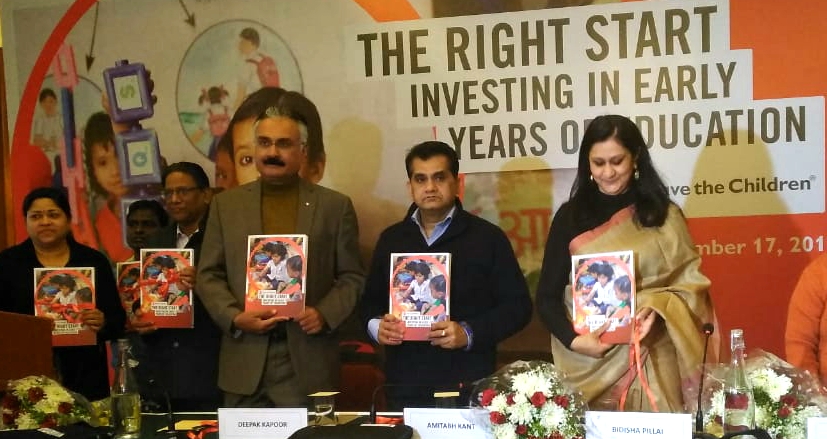
New Delhi | December | 17, 2018 :: Save the Children and the Centre for Budget & Policy Studies (CBPS), Bangalore, published a research study titled “THE RIGHT START – Investing in Early Years of Education”. The study, released by Shri Amitabh Kant, CEO, NITI Aayog, assesses the various models of Early Childhood Care & Education (ECCE) to understand the situation in India and the gaps associated with it. It also consolidates some non-negotiable factors across these models for quality ECCE.
Speaking on the occasion, Amitabh Kant said, “A child’s maximum cognitive growth happens in the early years and while good health and nutrition contribute to this, it is also very important to invest in early education. I am extremely happy and would like to congratulate Save the Children for publishing this study, “The Right Start” which brings to light the different models of ECCE, along with the costing, so that investing is done in a realistic manner based on certain non-negotiable components which are critical for children’s learning and development. We would like to consider the recommendations given in this study and create a mass movement to catalyse holistic development of children up to 8 years of age”.
Bidisha Pillai, CEO, Save the Children added, “The report recognises the significant impact of early childhood care and identifies that despite a Universalised Integrated Child Development Services (ICDS), around half of India’s under-six population does not participate in any form of pre-primary education. The lack of a regulatory framework for the rapidly expanding private sector, the second largest provider of ECCE, raises matters of concern around quality and equity. While there have been several government policies and frameworks reaffirming commitment to developmentally appropriate ECCE services. There is a need to understand and analyse the different components of national and the state budgets given that the budget classification in India does not follow a programmatic representation and many expenditures that cater to children’s wellbeing are provided under different programmes/functions. The study strives to arrive at the expenditure on children based on the schemes that relate to children in a substantial way”.
The study recommends that issues of financing, implementation, quality, accessibility and equity remain to be adequately addressed, with there being no legislation for mandatory ECCE provisioning for under-six year olds. With the expansion of the private sector and the work of the civil-society organizations, there is a need to compare the features, costs and revenues of different models to understand the scalability of the programme and also compare the same with the government sponsored programmes so as to understand how to improve upon the different programmes and to come up with different policy based recommendations for the improvement of the different ECCE services by different service providers.
Some key recommendations from the study are:
– Need to recognize an Anganwadi Workers (AWWs) as an ECCE professionals.
– Entitlements for Children, which includes
o Access to pre-school education
o Maintaining a safe environment in the ECCE Centre
o Promoting health and hygiene practices in the ECCE Centres
– Entitlement based Principles for costing the ECCE services, which includes
o Link salaries and other social security benefits to minimum skilled wages and assured social protection.
o Link nutrition expenditure to the minimum required food and nutrient norms.
o Decentralised unit cost estimates for infrastructure based on per-student requirement.
o Innovative solutions to minimize costs.
o Compulsory cost heads such as budgets for curriculum development and teacher training are established as non-negotiables.
– Regulation of non-Government ECCE interventions, which includes
o System to introduce regulatory practices.
o Ceiling on user charges
o Develop compulsory and universal age-specific suitable norms as ‘non-negotiables’ for running pre-school centres.
The status report also presents an account of the current status of under-six year olds in India, specifically in the three states of Delhi, Odisha and Telangana, identifying existing provisions as well as gaps and challenges with respect to ECCE. A comparison of the three states in the report shows that trends of health and nutrition indicators and pre-school participation vary widely across states and also when compared to all-India level statistics.
About Save the Children
Save the Children works across 20 states of India and in 120 countries, on issues related to education, health, protection and humanitarian/DRR needs of children, especially for those who are the most deprived and marginalized. Save the Children’s s association with India is more than 80 years old. Visit www.savethechildren.in for more information.


